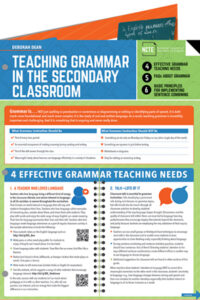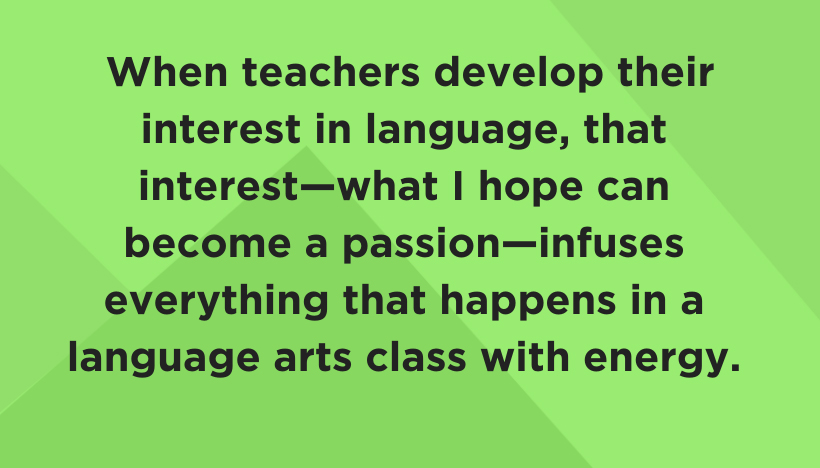This post was written by NCTE member Deborah Dean, the author of the new Quick Resource Guide (QRG) “Teaching Grammar in the Secondary Classroom.”
I think I am near the point of saying I enjoy grammar (the word grammar is still a little too charged for me, so I would probably say I enjoy language).
I no longer think that grammar is invariably tedious.
I am learning that grammar is a tool, not just a rule to be followed. The word “grammar” doesn’t scare me.
Before this class I never thought about language and grammar as a writer’s choice for effect. I thought about it like those nightmarish sessions before the ACT when my teacher was cramming in lessons about who and whom and semicolons and stuff. I definitely never thought about how grammar could be used to create more powerful, emotional writing.
It is wonderful to be filled with curiosity instead of fear. It’s almost a feeling of power and growth.
A few fist pumps might have accompanied my reading of these reflections from my preservice students at the end of our course on teaching grammar in secondary schools.
More than merely learning terms and concepts about grammar, I had hoped my students—these future language arts teachers—would leave the course and enter their own classrooms with a positive attitude about grammar instruction, as well as some tools that might help them share that attitude with their students.
I have always loved learning about language: the way words develop, the way people’s use of language changes in different situations or through time, the way we can put sentences together in multiple ways to create different effects. But I know that not everyone shares my enthusiasm. Teachers need to develop this interest, though; they need to find a way to engage with the essence of our content area—language. We can learn a lot about language instruction, but the key to our effectiveness is, ultimately, that we are genuinely interested.
When we are interested in something, we respond differently than if we don’t care: we find connections to our passion in everything we do during the day; we bring it up in conversations; we continue to learn about it whenever we can; and we try to engage others in our passion.
I encourage my students to use my own enthusiasm as a starting place. I bring interesting aspects of language I see in the world around me to class—an advertisement that uses what is traditionally a noun as a verb, for instance, or a new word being used frequently by students (raggabrash was a recent example). Although these short discussions might not be directed at a specific standardized learning objective or standard, they build interest in language that can transfer to the reading and writing we do for the bulk of our classes, developing interest and awareness of how we use and interpret language.
When teachers develop their interest in language, that interest—what I hope can become a passion—infuses everything that happens in a language arts class with energy. That’s one reason a goal of my course for preservice course is to encourage students’ interest in language as more than rules, more than structures, and more than drills or whatever other negative prior experience they have had with language study.
That energy is at the heart of why, when we read Al Capone Does My Shirts, and read the passage about Natalie’s testing at UCLA, we can stop and consider how the repeated use of short, choppy sentences, even fragments, provides insight into how Moose feels about what his family is going through, how the language helps us see beyond the words to the emotions of the experience.
This interest in and energy with language helps us when we read Atticus’s closing speech to the jury in To Kill a Mockingbird, where we recognize how he uses names and pronouns to make Tom Robinson more human and the Ewells less so. We learn that we can do the same thing with language—say more with words than simply what’s on the surface.
With our passion about language, we are more likely to use authentic experiences—the texts our students are reading and writing, language events in popular culture, spontaneous exchanges in class—to engage their natural interest in language and enhance their curiosity about it. And we set our students up for being interested users of language throughout their lives. And that’s worth a big fist pump.


Deborah Dean is a former secondary English teacher, and currently a professor of English at Brigham Young University, where she teaches preservice and practicing teachers about writing instruction. She is the author of Strategic Writing: The Writing Process and Beyond in the Secondary English Classroom; Genre Theory: Teaching, Writing, and Being; What Works in Writing Instruction: Research and Practices, and of the Quick Resource Guide (QRG) “Teaching Grammar in the Secondary Classroom.”
It is the policy of NCTE in all publications, including the Literacy & NCTE blog, to provide a forum for the open discussion of ideas concerning the content and the teaching of English and the language arts. Publicity accorded to any particular point of view does not imply endorsement by the Executive Committee, the Board of Directors, the staff, or the membership at large, except in announcements of policy, where such endorsement is clearly specified.

